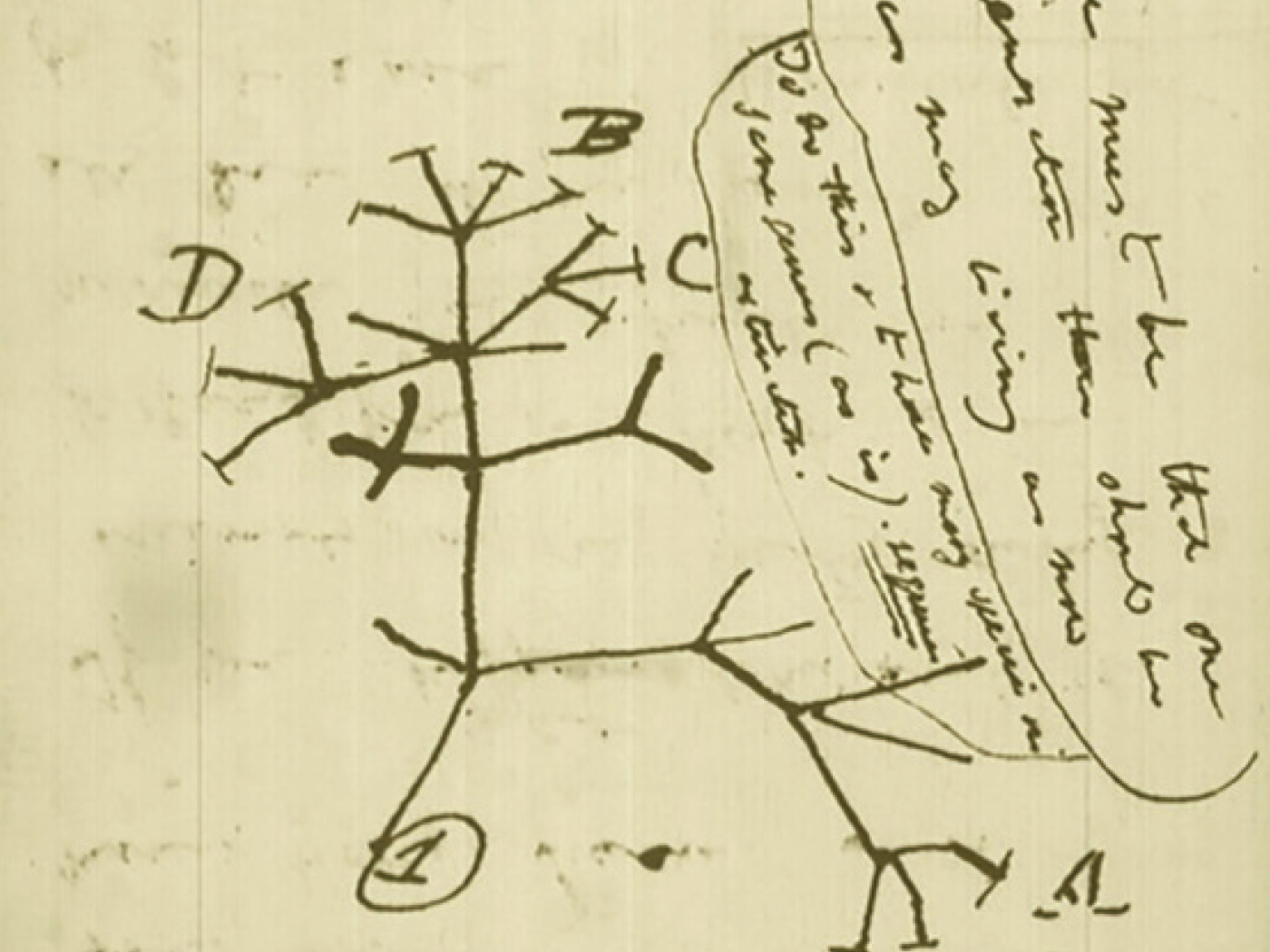Most people have heard of “evolutionary biology.” But the term “evolution” is often applied in a broader sense (gradual, naturalistic changes over long ages) to other fields of study. Some people study geology or astronomy from an evolutionary perspective. But has anyone ever studied “evolutionary mathematics”? What would an evolutionist mathematician study? Can the existence of numbers and mathematical laws be explained by a time-and-chance naturalistic origin?
To answer these questions, let us first consider some background material and definitions. Mathematics is the study of the relationships and properties of numbers. What, then, are numbers?
That may seem like an obvious question because numbers are so foundational to our thinking. But sometimes these foundational concepts are the most difficult to define. Perhaps this explains why various dictionaries give such a wide range of different definitions of the word “number.” One of the better definitions is “a concept of quantity that is or can be derived from a single unit, the sum of a collection of units, or zero.”1
Numbers are concepts. Thus, they are abstract in nature. They exist in the world of thought and are not material or physical. You cannot literally touch a number, or even see one, because they are not made of matter. This confuses some people because we often talk of written instances of numbers as if they were the actual number. For example, suppose I write down the number three. If I look at what I’ve written, am I seeing an actual number? Well, no. If I then erase what I’ve written, have I then destroyed the number three? If what I wrote is literally three, then when I erase it, will I have erased three? Clearly not.
The written expression of the number three, called a “numeral,” is merely a representation of the number, not the actual number. Removing the numeral does not cause the number to cease to exist. In fact, the number three existed before anyone ever wrote down the numeral that represents it.
Likewise, if the word “lion” is written on a piece of paper, it represents a particular thing. Erasing the word would not affect the actual lion at all. But whereas the word “lion” represents a physical reality, something that can be seen and touched, a numeral represents an abstract reality—something that cannot be seen or touched, but nonetheless exists. Although the concept of a number can be applied to physical things, the concept itself is not physical.
If numbers are not material, do they actually exist?
Some people might think that only physical things can exist—that matter and energy comprise every real thing.2 But, of course, in the Christian worldview we can have non-material entities that do exist. God is an obvious example. He exists, but is not made up of matter or energy. So the Christian worldview allows for numbers to have real existence, even though they are not material things. Numbers have properties that wouldn’t make sense if they didn’t exist. In fact, if numbers did not exist, then we could not use them. (Try using something that doesn’t exist—it is very difficult!) Other examples include logic, love, and laws. Clearly, numbers are real, yet abstract entities.
Children are often taught about numbers starting with something physical. There are three apples or three rocks. The apples and rocks are physical, but “three-ness” is not. Quantity is a concept. Though it can be applied to physical things, it exists apart from them. For example, as far as I know, I have never seen 1,200,436,172 instances of a particular thing. And yet, that number still has meaning. I know that it is larger than 1,200,436,171 and smaller than 1,200,436,173, even though I have never counted any such quantity of physical things. Numbers exist apart from physical things, even though they can be applied to a quantity of physical things.
Can a secular worldview make sense of abstract concepts like numbers?
What are laws of mathematics?
Laws of mathematics are rules that describe the relationships between numbers. As one example, the commutative law of addition shows us that 2+3=3+2. There are many laws of mathematics, and some can be logically or mathematically derived from other laws. Laws of mathematics are (1) universal, (2) invariant, (3) absolute, and (4) abstract. Let’s consider each of these in turn.
Mathematical laws are universal—they apply everywhere. When we add 2+3 in Europe, we get exactly the same answer as we get in the United States. For that matter, laws of mathematics work just as well on Mars, Alpha Centauri, the Andromeda Galaxy, or in the core of a distant quasar. Many laws of nature, including the laws of physics and the laws of chemistry, are mathematical in nature. So if laws of mathematics were different in various regions of the universe, then presumably laws of physics and chemistry would also differ in an unpredictable way. This would render astronomy impossible.
Mathematical laws are invariant; they do not change with time. Just as 2+3=5 today, so it did yesterday, and so it will tomorrow. All mathematical laws are such that they remain the same at all times. They are absolute. It’s not that 2+3 usually equals 5; rather, it always equals 5. There are absolutely no exceptions. And like numbers themselves, laws of mathematics are abstract and conceptual in nature. They cannot be seen, felt, moved, or eaten. Of course, we can write down expressions that represent such laws, just as we can write down numerals that represent numbers. But erasing the expression will not obliterate the mathematical law that it represents.
Is mathematics an invention of humanity?
Some people have supposed that mathematics is a creation of human beings, like the printing press or the internal combustion engine. But are numbers and laws of mathematics really inventions of man? Things that are designed and created by people could have been designed and created differently. When two people independently invent the same type of thing, there are differences in the design and construction since each person has taken a different creative approach to solving an engineering problem. Moreover, the designs of various manmade contraptions are often improved down the line as innovative new solutions are proposed and new technologies are developed.
If mathematics were manmade, then we would expect it to exhibit these characteristics as well. We would expect different mathematical laws for different mathematicians, and improvements to such laws as time progresses. As society changed, so would laws of mathematics. Is this what we find?
Undoubtedly, the written expression of mathematical laws is manmade. There are several different notations used in various fields of mathematics, and various mathematicians in the past have used different notations to express mathematical truths. Some notations are more useful than others, while less useful notations often fall into disuse. However, these different symbols are merely different ways of expressing the same mathematical reality. For example, Roman numerals express the same numbers as the more familiar Arabic system. All mathematicians have the same laws of mathematics, although they may use different systems and different notations to express those laws.
Laws of mathematics are discovered by people and written down by people. But they were not created by people. As discussed above, laws of mathematics do not change with time. Therefore, they existed before people existed. So they obviously cannot be a creation of man. The equation 2+3=5 was true long before any human being thought about it, realized it, or wrote it.
The origin of mathematics
How then do we account for the origin and properties of numbers or the laws of mathematics that describe them? Let’s consider first the naturalistic, or evolutionary, view. In this way of thinking, people attempt to explain the characteristics of a modern object by considering how it gradually evolved over millions or billions of years from something less complex. If we applied this concept to mathematics, we would ask, “From what did numbers evolve? What were numbers before they were numbers? When did the physical universe begin obeying mathematical laws?”
Just take one number as a token case. From what simpler number did the number 7 evolve? Was 7 once 3? Did 3 have to transition through 4, 5, and 6 before it became 7? When did the negative numbers evolve? Or how about the irrational numbers? When did these numbers begin obeying mathematical laws? Did laws of mathematics evolve first, and then numbers later? Or was it the reverse?
If these sorts of questions sound silly, it is because they are. The evolution of numbers makes no sense whatsoever. 7 has always been 7, just as 3 has always been 3. Likewise, the expression 2+3=5 was as true at the beginning of time as it is today. Mathematical laws and the numbers they govern are invariant—they do not change with time and, therefore, cannot have evolved from anything!
The secularist is truly stuck when it comes to mathematics. He knows that mathematical truths existed before human beings discovered them. For example, the orbits of the planets around the sun were described by the mathematical formulae expressed in Kepler’s laws before human beings existed. And yet laws of mathematics are conceptual in nature. Concepts exist in a mind; they are objects of thought. So how can a conceptual entity like math exist before any mind is around to think it?
How is it that numbers are conceptual—the result of a mind—and yet they go beyond the human mind’s capacity to fully understand (such as infinity) and predate the existence of the human mind? The answer is that numbers are not the product of a human mind, but rather the product of the mind of God. The terrible dilemma faced by the secularist simply does not occur in the Christian worldview. It’s not a problem for the biblical creationist to have conceptual entities existing before human minds because human minds are not the only minds that exist in the Christian worldview. Numbers are a reflection of God’s thoughts. Numbers existed before people because God’s thoughts existed before people.
Laws of mathematics are a reflection of how God thinks about numbers. The internal consistency of mathematics is a reflection of the internal consistency within the Godhead. The invariant nature of mathematics is a reflection of the unchanging nature of God. Since God is beyond time (2 Peter 3:8), His thoughts do not change with time and, thus, neither do laws of mathematics. Laws of mathematics apply everywhere because God is omnipresent (Jeremiah 23:24). Laws of mathematics are absolute because God is sovereign and does not change His mind (1 Samuel 15:29). Laws of mathematics are real and, yet, not physical—just as God is real and not physical in His essential nature.
The biblical creationist can also make sense of why the physical universe obeys mathematical laws. God upholds the universe by the expression of His power. So, naturally, the universe will be consistent with the thoughts of God. Human beings are able to think about and use math because we are made in the image of God. His thoughts are reflected in us when we think rightly about anything. We can use mathematics to understand and solve problems in the material universe because the material universe is upheld by the same mind responsible for laws of mathematics. The properties and usefulness of laws of mathematics make perfect sense to the consistent Christian. But mathematics is simply not amenable to a naturalistic, evolutionary explanation.
In 1960, the physicist Eugene Wigner published a classic article from his secular point of view on the topic of why the physical universe obeys mathematical laws. The title of the article, “The Unreasonable Effectiveness of Mathematics in the Natural Sciences,” highlights the problem for the secular worldview. Just why does the physical universe obey laws of mathematics? Though not a believer, Wigner states, “It is difficult to avoid the impression that a miracle confronts us here…or the two miracles of the existence of laws of nature and of the human mind’s capacity to divine them.” Indeed, how can one accident of nature come to understand another? In his closing paragraph, Wigner states, “The miracle of the appropriateness of the language of mathematics for the formulation of laws of physics is a wonderful gift which we neither understand nor deserve.”3
Wigner is quite correct that the correspondence of abstract mathematical laws to material things cannot be understood from a secular standpoint. Of course, the biblical creationist can account for the success of mathematics in formulating scientific laws. We expect such rationality since the universe is upheld by the mind of God.
It is tempting for secularists to invoke a naturalistic, evolutionary explanation for things that are only truthfully explained by God’s design. Whether it is the intricate workings of a living organism, or the existence of the solar system, gradual change over time is considered to be the “creator”—not God. They promote the idea that if you just give it enough time, then the impossible becomes inevitable through gradual, naturalistic change.
Of course, there are many reasons to reject such conjectures when they pop up in fields of biology or astronomy. But seldom will you hear an evolutionary tale of the origin of mathematics because it just isn’t possible. Numbers cannot have evolved because numbers cannot change. For the most part, secularists don’t even attempt to explain mathematics at all. Mathematics is an inherently creationist field of science. There are creation biologists and evolution biologists. There are creation geologists and evolution geologists. But when it comes to mathematics, everyone is a creationist.
References
- Collins English Dictionary, 10th ed. 2009. HarperCollins Publishers. Posted on dictionary.com, accessed October 10, 2012.
- This view is called “materialism.”
- Wigner, E. P. 1960. The Unreasonable Effectiveness of Mathematics in the Natural Sciences. Communications on Pure and Applied Mathematics. 13(1):1-14.
* Dr. Lisle is Director of Physical Sciences at the Institute for Creation Research and received his Ph.D. in Astrophysics from the University of Colorado.
Cite this article: Lisle, J. 2012. Evolutionary Math? Acts & Facts. 41 (12): 11-13.











